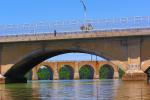 Registration is now open for the sixth annual Sustainable Raritan River Conference, “Valuing Natural Capital and Ecosystems Servcies.” It will be held on Friday, June 13 at the Cook Campus Center on the Rutgers University’s New Brunswick Campus, from 8 a.m.-4:30 p.m. This year’s conference theme focuses on the intrinsic values that the Raritan brings to the communities, businesses, and residents (human and non-human alike) throughout the region.
Registration is now open for the sixth annual Sustainable Raritan River Conference, “Valuing Natural Capital and Ecosystems Servcies.” It will be held on Friday, June 13 at the Cook Campus Center on the Rutgers University’s New Brunswick Campus, from 8 a.m.-4:30 p.m. This year’s conference theme focuses on the intrinsic values that the Raritan brings to the communities, businesses, and residents (human and non-human alike) throughout the region.
In this full-day conference, participants will meet experts working on valuing natural capital and ecosystem service concepts, learn how to use such valuations in planning decisions, and discuss real-life examples of how these valuations have changed ecological outcomes while also discussing how these practices can be applied in the Raritan region to help organizations, businesses and local governments make better land use decisions.
Invited speakers include David Batker, chief economist and executive director, Earth Economics; Stephanie Pendergrass Dalke, project director, Pinchot Institute for Conservation; Patricia Elkis, deputy planning director, Delaware Valley Regional Planning Commission; Dr. Gerald Kauffman, project director, Water Resources Agency, University of Delaware; John Miller, associate water resources engineer, Princeton Hydro, LLC; Elizabeth Schuster, environmental economist, New Jersey chapter of The Nature Conservancy; Julie Ulrich, urban strategies and watershed coordinator, The Nature Conservancy; and many more.
Nominations are also being accepted for the 2014 Sustainable Raritan River Awards, which will be presented at the conference. These annual awards are presented for outstanding achievement in efforts to revitalize our region, restore and protect our resources, and promote our area as a premiere place to live, work and raise a family. Award categories include public education, government innovation, stewardship, public access, remediation and redevelopment, sustainable business, and leadership. More information about the awards and nomination instructions can be found on the Sustainable Raritan River website. Previous award recipients can also be found on the website.
Registration is required for the conference; please register using our secure link and join us for this next step towards sustainability for the Raritan. Questions about the event can be directed to Sara Malone or by calling (848) 932-2720.
Continuing education credits are pending. Due to the nature of this program, no refunds will be given. Substitutions are permitted.
